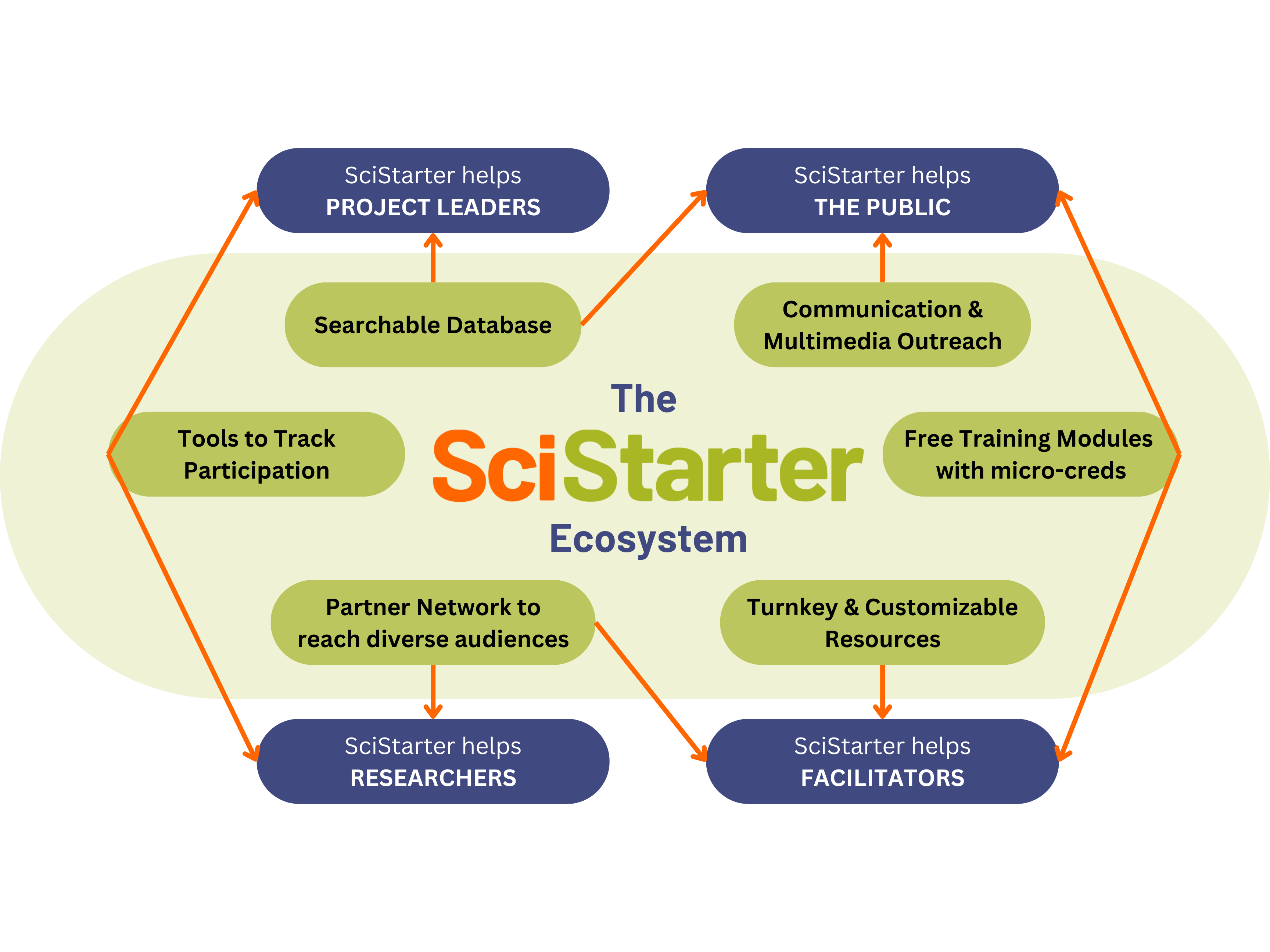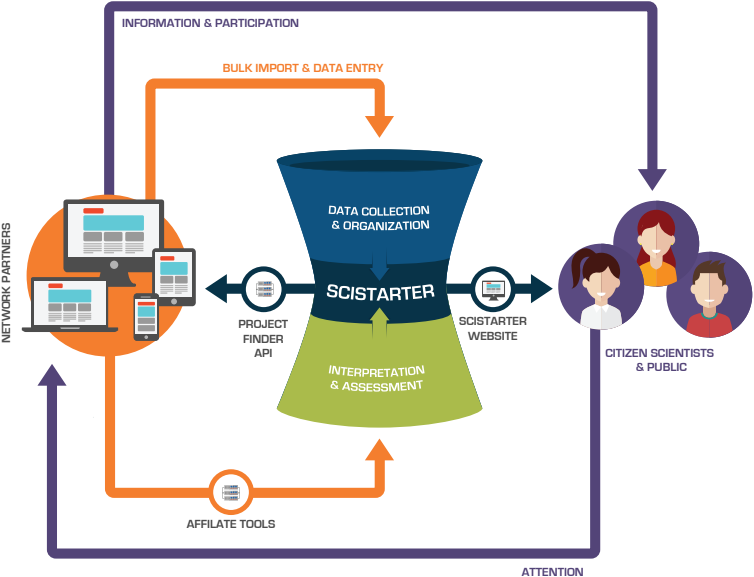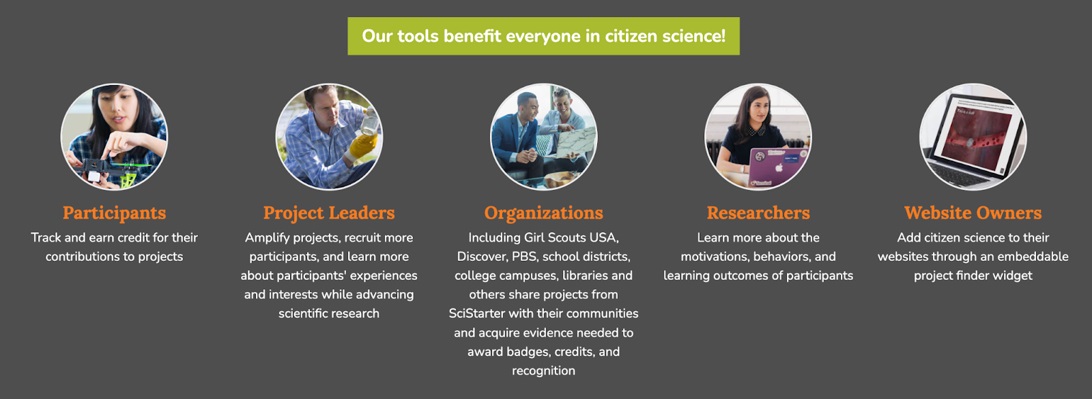
Mission
SciStarter helps bring together millions of curious and concerned people in the world; the thousands of opportunities to engage in real-world research questions in collaboration with researchers, communities, organizations, and companies; and the resources, products, and services that enable people to pursue and enjoy these activities while learning and accelerating important research. Together, we can help answer questions that cannot be answered alone. When we’re all involved, the science is better. (Learn more about citizen science.)
We aim to:
- Enable and encourage people to learn about, participate in, and contribute to real science through both informal recreational activities and formal research efforts.
- Inspire greater appreciation and promote a better understanding of science and technology.
- Create a shared space where scientists and project leaders can collaborate with people interested in working on or learning about their research projects.
- Satisfy the popular urge to tinker, build, and explore by making it simple and fun for everyone from all walks of life to turn their curiosities and concerns into real impact.
SciStarter is a globally acclaimed, online citizen science hub where thousands of projects, searchable by location, topic, age level, etc., have been registered by individual project leaders or imported through partnerships with federal governments, NGOs, and universities. As a research affiliate of North Carolina State University (NCSU) and Arizona State University (ASU), and a popular citizen science portal, SciStarter hosts an active community of close to 200,000 registered SciStarter members and millions of additional site visitors. Hundreds of citizen science projects use SciStarter’s National Science Foundation (NSF)-supported APIs to help volunteers earn credit for their participation in their SciStarter dashboard, across all kinds of projects and platforms. These features enable SciStarter’s partners (libraries, schools, museums, Girl Scouts and more) to catalyze customized engagement pathways and track and support the progress of their communities through SciStarter. SciStarter also supports researchers in managing projects, including best practices for engaging participant partners.
SciStarter also develops and distributes original content across syndicated blogs, a podcast, weekly events on Zoom, a bi-monthly newsletter, bi-monthly emails to members, social media and a YouTube channel. Learn more about these media platforms and other SciStarter developments in this blog post: SciStarter 2022: Year in Review.

History
SciStarter grew out of a graduate school project Darlene Cavalier was working on at the University of Pennsylvania in her quest to learn how people without science degrees (like Cavalier) could meaningfully engage in science. In 2011, the National Science Foundation provided a grant to Cavalier and SciStarter to create a more user-friendly interface, to become the canonical source of project meta data among thousands of projects, and to launch outreach strategies with Discover Magazine among other media outlets. In 2014, Arizona State University and SciStarter joined forces to create an ongoing series of research and development initiatives, primarily supported by the National Science Foundation. In 2017, the Institute for Museum and Library Services (and later the Moore Foundation) provided funds to ASU and SciStarter to create and circulate kits and trainings for Libraries as Community Hubs for Citizen Science catalyzing awareness of and engagement in participatory research.. In 2019, the National Library of Medicine awarded grants to ASU and SciStarter to launch and expand Citizen Science Month through 2026. In 2020, the SciStarter team authored The Field Guide to Citizen Science, published by Hachette Publishing. 2021-2026 SciStarter and ASU receive commitments to support the rapid growth of the platform and partnerships from a variety of sources including:
National Science Foundation, National Library of Medicine, Institute for Museum and Library Services, National Aeronautics and Space Administration, the Gordon and Betty Moore Foundation, Verizon, Girl Scouts of America, Broward County School District, Arizona State University, North Carolina State University, University of Pittsburgh, University College London, and other funders.
How it works
SciStarter digitally connects and disseminates otherwise siloed citizen science activities and makes engagement trajectories explicitly visible in service to the public, organizers, and researchers.
By revealing patterns of engagement, SciStarter revolutionizes assessments, supports deeper engagement across a spectrum of citizen science environments, and drives initiatives to reach new audiences and increase participation.
SciStarter works with many partners and funders to design, develop, pilot test, evaluate, iterate then scale programs to support four beneficiaries:
- Public(s)
- Project Scientists and Event Organizers
- Researchers
- Facilitators
This Powerpoint Slide Deck was presented at the American Association for the Advancement of Science annual conference in 2022 and it summarizes the benefits to the beneficiaries.
- Tools to organize data from trusted sources (see Cataloging Guidelines).
- Dashboards to showcase participation (see SciStarter.org/dashboard).
- Trainings and embedded assessments to evaluate outcomes (see SciStarter.org/training and SciStarter.org/research).
- Analytics to support outreach strategies.
- AI-powered recommendation system (see homepage, dashboard and SciStarter.org/research).
- Citizen Science Kits in circulation at libraries across the country (see SciStarter.org/library).
- Social media integration.
- Research and evaluation to support data-driven growth in the field.
- Events and papers to connect participatory research sectors (see ASU Citizen Science Maker Summit).
- Books to build awareness of participatory research, including popular non-fiction and academic books.
- Syndicated, dissemination platforms to amplify opportunities and outcomes including our blogs on SciStarter and Discover Magazine, newsletter reaching close to 100,000 people, social media reaching tens of thousands, podcast with more than 10,000 downloads, online/live events, user messaging reaching more than 200,000 people.

Cataloging Guidelines
SciStarter connects people to citizen science projects, programs and events in need of their help. We organize these opportunities (which are typically offered by universities, government agencies, informal learning environments) from all over the web and make them 1) searchable through a Project Finder, 2) discoverable through plug-and-play digital tools that enable other websites to customize and embed the searchable database, 3) usable to multiple audiences by customizing project instructions, adding videos and other supplemental support structures, and connecting them to facilitated communities including schools, universities, libraries, Girl Scouts, 55+ organizations, corporate volunteer programs and other organizations, and 4) valuable by boosting functionality between SciStarter and select projects so participants can track their interests and participation in projects across websites and apps to earn badges and formal and informal credits. This helps researchers and facilitators measure collective impact across communities and projects/platforms making SciStarter a critical resource to advance understanding about citizen science (landscape of projects and people), advance scientific research, and improve science and society by empowering people from all walks of life to actively shape and accelerate research.
How We Organize and Share Records
There are two ways records become part of the SciStarter database: 1) Individual project/program/event coordinators add information using an online form (SciStarter.org/add); 2) Using APIs, SciStarter and another (typically topic-specific) catalog of citizen science opportunities exchange records (SciStarter.org/API). In both cases, SciStarter hosts information about the opportunities to help people more readily find them. Most of the resources reside on other websites or apps so when a SciStarter visitor clicks to engage in an opportunity, they are typically directed to the host’s website.
The descriptive information SciStarter organizes is called “metadata” and the metadata schema we use is part of a global agreement to use the same core metadata field (see Public Participation in Scientific Research PPSR Core documentation). SciStarter is the largest collection of citizen science projects in the world and SciStarter both helped create and expanded on the PPSR Core metadata standards to 1) make it easier for people to find the right project based on location, age, interests and skills and 2) help researchers who study “public engagement in science” understand the landscape of opportunities that exists thereby finding overlaps and gaps. Databases we connect include CitSci.org , Anecdata, iNaturalist, InstantWild, QuestaGame, the Federal Inventory of Citizen Science projects, Atlas of Living Australia, Zooniverse and others. We deduplicate records and make the collection shareable through free, customizable widgets and APIs. Other websites such as PBS SciGirls and Cornerstones of Science use our free tools to help their viewers discover opportunities to engage in citizen science! They don’t need to create their own databases, they just use SciStarter’s clean, updated, aggregated database and interface.
Project Metadata Schema: https://SciStarter.org/schema/Project
Participant Metadata Schema: documented on https://SciStarter.org/API under the Documentation tab, in the “Use the Participant API with OpenID Connect” section.
Criteria for Records
Citizen science projects, programs, and events submitted to SciStarter should be opportunities for members of the public to engage in science that will advance an area of research and development. These are distinct from most STEM programs which primarily aim to educate the participant. Citizen science may educate a participant as a byproduct of their engagement, but the primary goal should be to answer science-based questions a scientist or concerned/curious person cannot answer with the help of other people through the use of data contributions or data analysis. Most citizen scientists have no formal background in science. Citizen science opportunities can scale all ages but, due to data quality and online legal considerations, most opportunities are aimed at 13 years or older. If IRBs (institutional review boards) are required, then the audience will be 18+. SciStarter is global so opportunities can take place anywhere in the world, online or offline, spanning all types of science topics and activities.
We seek projects and events that ensure a participant’s time will not be wasted. SciStarter is not a repository for STEM learning resources. Only projects that commit to using data shared or analyzed by participants are eligible for publication on SciStarter. SciStarter is not a crowdfunding or fundraising site. Our editorial team reviews every record entered through SciStarter.org/add and determines whether the record meets our criteria. If so, the record is published and the owner is notified. Free data and promotional tools are then available to the owner. If the record does not meet our criteria, the owner is contacted with questions and/or the record is flagged and never published. Unpublished or flagged records are not shared through our Project APIs and therefore not shared in widgets and on other sites.
Owners of the records keep all rights and agree to permit SciStarter to use and share any content (including images, videos, downloadables, etc.) and all metadata with any user or partner of SciStarter (including media partners, commercial partners, etc.). Anyone adding records to SciStarter permits SciStarter to edit, reformat, publish, unpublish, or remove records and to share all metadata and content through APIs and other forms of batch dissemination including those with media. See Terms of Use and Consent for details.
